Did you know that up to 60% of the human body is water? This shows how vital hydration is for our health. Water helps control our body temperature and supports our body’s functions.
In today’s busy world, we often forget to drink enough water. But not drinking enough can harm our health. We’ll look into why hydration is key, how to spot dehydration, and how to drink enough water for good health.
Key Takeaways
- Water makes up 60% of the human body, highlighting its critical role in overall health.
- Proper hydration is essential for regulating body temperature, cellular function, and nutrient transport.
- Dehydration can lead to a range of physical and cognitive symptoms, including fatigue, headaches, and mood changes.
- Calculating your personal hydration needs based on factors like age, activity level, and climate is crucial for maintaining optimal health.
- Electrolyte balance is just as important as water intake, and natural sources like fruits and vegetables can help maintain this balance.
The Science Behind Proper Hydration
Staying hydrated is more than just drinking water. It’s a science-backed process that helps our body regulate temperature, function cells, and transport nutrients. Knowing how important it is to stay hydrated can help us value it more.
How Water Regulates Body Temperature
Water is key for keeping our body temperature stable. When we exercise or get too hot, we sweat to cool down. Replacing lost fluids is vital to avoid overheating and illnesses. Drinking enough water helps our body stay cool and work well.
Cellular Function and Water Balance
At the cellular level, water is crucial for balance. It carries nutrients, helps with chemical reactions, and removes waste. Without enough water, cells can’t function right, affecting our health.
Transport of Nutrients and Waste
Water helps move nutrients and oxygen to cells and takes away waste. This keeps our body running smoothly and removes harmful stuff. Drinking enough water supports this process, keeping us healthy.
| Function | Importance of Hydration |
|---|---|
| Body Temperature Regulation | Maintaining fluid balance to prevent overheating and heat-related illnesses |
| Cellular Function | Facilitating nutrient transport, chemical reactions, and waste removal at the cellular level |
| Nutrient and Waste Transport | Ensuring the efficient delivery of essential resources and the elimination of harmful substances |
“Proper hydration is not just about quenching thirst; it’s a fundamental aspect of maintaining overall health and well-being.”
Understanding hydration’s science helps us see its value. It guides us to make choices that support our body’s best functioning.
Essential Signs of Dehydration Symptoms to Watch For
Keeping your body hydrated is key to staying healthy. But spotting the early signs of dehydration can be tricky. Knowing the common dehydration symptoms helps you act fast to replenish fluids and avoid bigger health problems.
Feeling very thirsty is a clear sign of dehydration. If you’re always reaching for water or other drinks, your body might need more fluids. Also, dry mouth, lips, and tongue are signs you need to drink more.
Headaches, dizziness, and feeling tired are other dehydration symptoms. These happen when your body can’t keep the right fluid balance or control its temperature. If you notice these, it’s crucial to drink water right away.
- Reduced urine output or dark yellow urine
- Muscle cramps or spasms
- Constipation or infrequent bowel movements
- Dry, itchy skin
Spotting these dehydration symptoms and acting quickly keeps your hydration levels in check. By focusing on fluid replenishment, you help your body work its best.
| Dehydration Symptom | Potential Causes | Importance of Addressing |
|---|---|---|
| Excessive thirst | Fluid loss, electrolyte imbalance | Indicates a need to increase fluid intake to maintain proper hydration levels |
| Dry mouth, lips, and tongue | Insufficient fluid intake, dehydration | Can lead to discomfort, difficulty swallowing, and increased risk of infections |
| Headaches, dizziness, and fatigue | Dehydration, electrolyte imbalance | Can impair cognitive function, physical performance, and overall well-being |
| Reduced urine output or dark yellow urine | Dehydration, kidney issues | Indicates a need to increase fluid intake and monitor kidney health |
| Muscle cramps or spasms | Dehydration, electrolyte imbalance | Can lead to discomfort, impaired physical function, and increased risk of injury |
| Constipation or infrequent bowel movements | Dehydration, lack of fiber | Can cause discomfort, digestive issues, and potential long-term health problems |
| Dry, itchy skin | Dehydration, environmental factors | Can lead to skin irritation, increased susceptibility to infections, and poor appearance |
Understanding dehydration symptoms and staying hydrated is key to your health. Being alert and acting early can prevent serious health issues later.
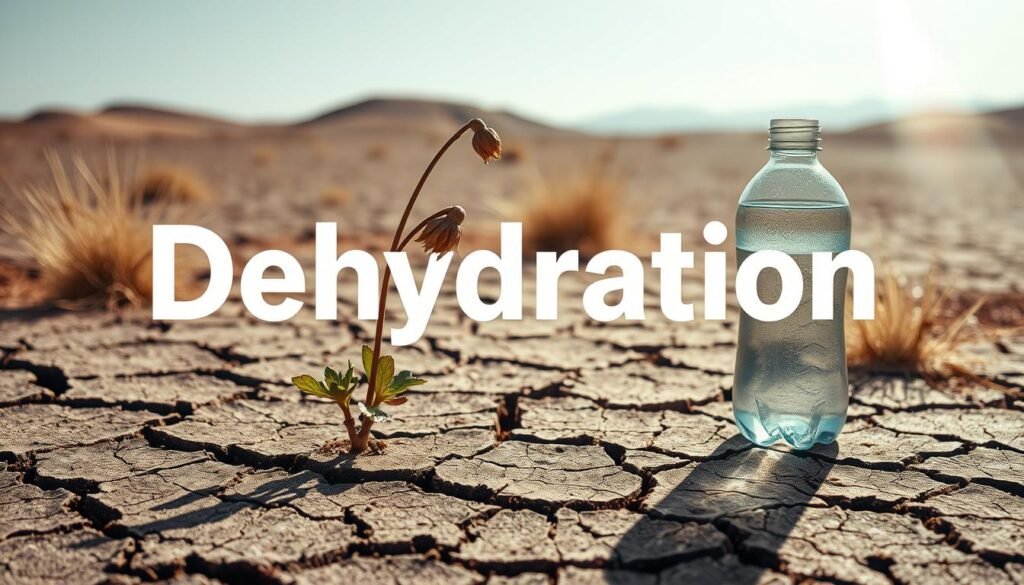
“Proper hydration is not just about quenching your thirst; it’s about ensuring your body has the fluids it needs to function at its best.”
Daily Water Intake Requirements for Optimal Health
Drinking enough water is key for good health. But how much water do you need each day? It depends on several things, but knowing your needs helps you stay hydrated.
Calculating Your Personal Hydration Needs
Adults should aim for around 8 cups (64 ounces) of water per day. But, your needs can change based on your age, gender, how active you are, and your health.
Factors Affecting Water Requirements
- Age: Older adults may need more water as their bodies can’t balance water as well.
- Gender: Men usually need a bit more water than women because of body differences.
- Activity Level: People who are active or live in hot, humid places need more water to replace lost fluids.
- Health Conditions: Some health issues, like diabetes or kidney disease, can affect how much water you need.
Best Times to Drink Water
- Drink water first thing in the morning to rehydrate after sleep.
- Drink before, during, and after exercise to replace lost fluids.
- Drink with meals to help with digestion and nutrient absorption.
- Drink water throughout the day, not just when you’re thirsty.
Knowing your hydration needs and drinking water regularly supports your health and well-being.
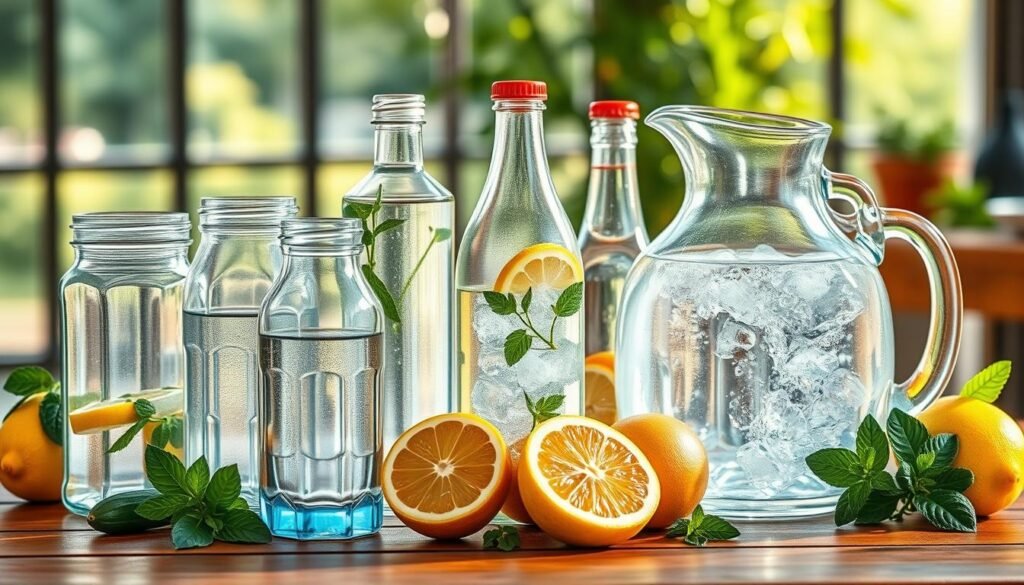
Understanding Hydration Importance in Daily Life
Drinking enough water is key for our daily lives. It’s not just about drinking when we’re thirsty. Water intake is vital for our health and how well we feel. It affects our physical and mental performance.
Drinking water helps a lot when we’re active. It keeps our body temperature right and helps our muscles and organs work well. Without enough water, we might feel tired, get muscle cramps, and can’t do as much.
But water does more than just help us when we’re active. It also boosts our brain power. Even a little dehydration can make us less focused, forgetful, and change our mood. Drinking enough water keeps our brain sharp and helps us stay alert and focused.
| Importance of Hydration | Impact on Daily Life |
|---|---|
| Physical Performance | Supports muscle function, regulates body temperature, enhances endurance |
| Cognitive Function | Improves concentration, memory, and mood |
| Overall Well-being | Promotes healthy skin, digestion, and immune system |
Drinking enough water also makes us feel better overall. It keeps our skin healthy, helps with digestion, and boosts our immune system. These are all important for living well every day.
Adding daily hydration habits to our routine can change our lives. Simple things like carrying a water bottle, setting reminders, or eating hydrating foods can improve how we feel and perform. It leads to a healthier, more productive, and happier life.
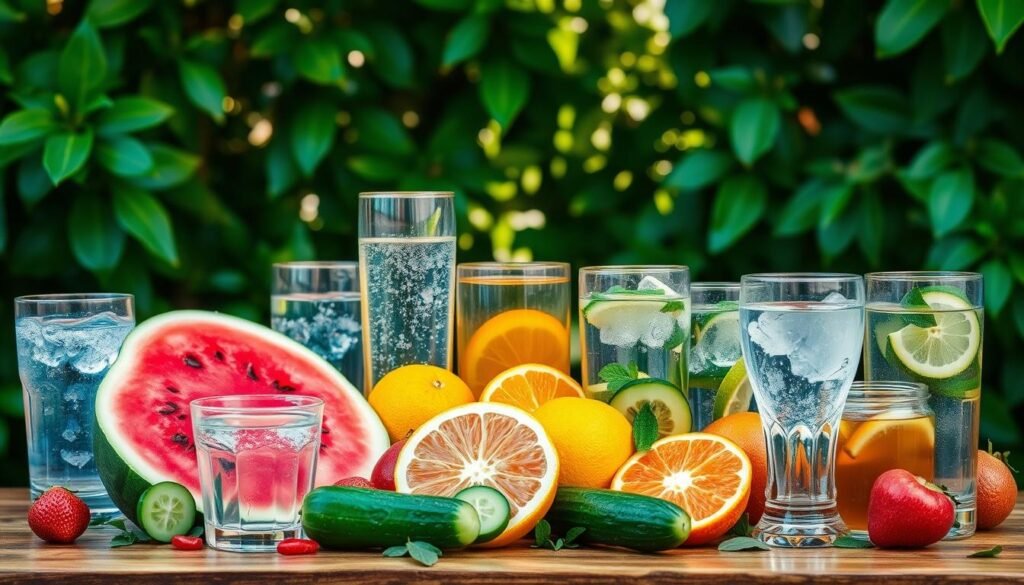
Electrolyte Balance: More Than Just Water
Drinking water is important, but it’s not everything. Your body also needs the right balance of electrolytes. These minerals help control fluid levels, muscle function, and health.
Key Electrolytes Your Body Needs
Your body needs sodium, potassium, calcium, and magnesium. These minerals help keep your electrolyte balance right. They support hydration importance and overall health.
Natural Sources of Electrolytes
- Sodium: Found in table salt, processed foods, and some vegetables like celery and beets.
- Potassium: Abundant in fruits, vegetables, and legumes, such as bananas, spinach, and lentils.
- Calcium: Dairy products, leafy greens, and fortified foods are excellent sources of calcium.
- Magnesium: Whole grains, nuts, seeds, and leafy greens are rich in magnesium.
Signs of Electrolyte Imbalance
Dehydration and fluid replenishment issues can cause electrolyte imbalances. Symptoms include muscle cramps, fatigue, confusion, and irregular heartbeat. It’s crucial to fix these imbalances to stay healthy.
| Electrolyte | Deficiency Symptoms | Excess Symptoms |
|---|---|---|
| Sodium | Muscle cramps, fatigue, dizziness | Confusion, seizures, coma |
| Potassium | Muscle weakness, irregular heartbeat | Nausea, vomiting, heart palpitations |
| Calcium | Bone loss, muscle cramps, numbness | Kidney stones, confusion, constipation |
| Magnesium | Muscle cramps, fatigue, loss of appetite | Diarrhea, abdominal cramps, low blood pressure |
Keeping your electrolyte balance right is key for good hydration importance and health. Knowing about electrolytes and their natural sources helps your body meet daily needs and stay active.
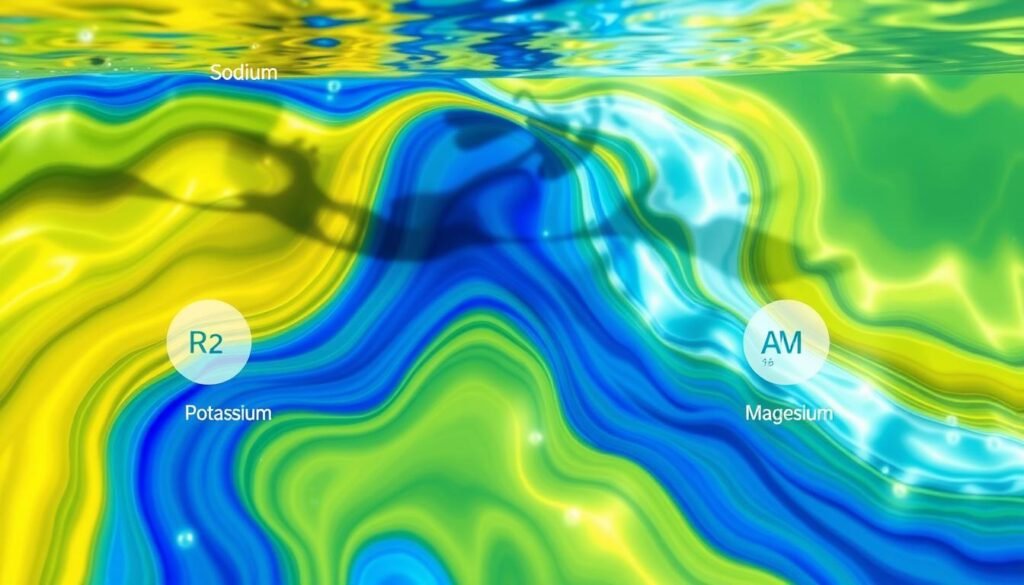
Impact of Hydration on Physical Performance
Drinking enough water is key for top physical performance. Being dehydrated can hurt your endurance, strength, and recovery. It helps keep your body cool, moves nutrients, and supports muscles and heart.
Even a small amount of dehydration can lower your exercise ability. It makes you feel like you’re working harder and affects your coordination. Dehydration can also cause muscle cramps, tiredness, and less focus, all bad for sports.
To perform at your best, you need a good hydration plan. This might mean:
- Drinking water all day, not just when you’re active
- Using drinks with electrolytes to replace lost minerals
- Changing how much you drink based on the weather, how active you are, and how much you sweat
By focusing on hydration importance and keeping your body well-hydrated, you can boost your physical performance. This leads to a healthier, more active life.
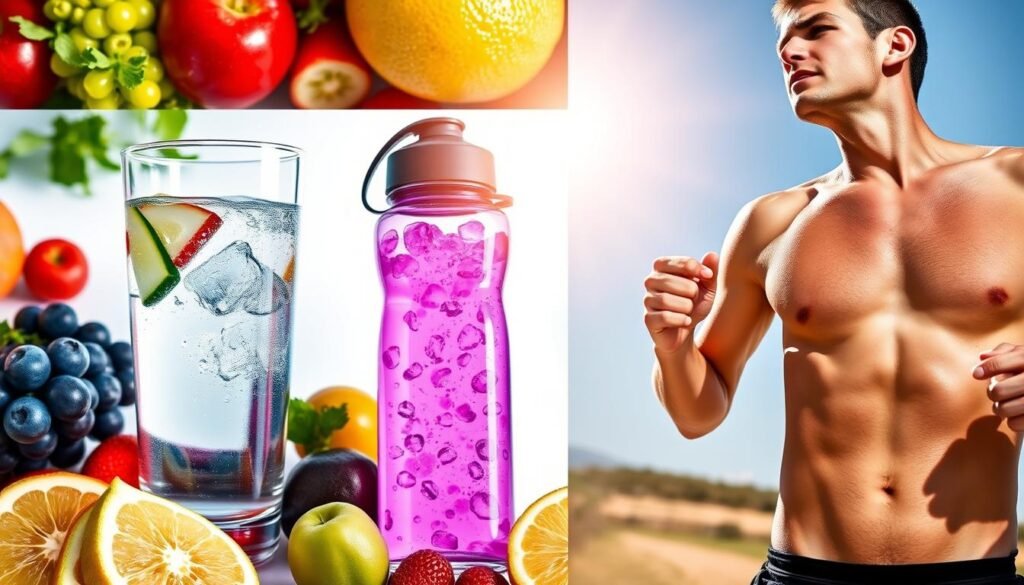
“Hydration is a critical component of athletic performance, as it helps regulate body temperature, maintains blood volume, and supports muscle function.”
How Proper Hydration Affects Mental Function
Drinking enough water is key for our body and mind. It boosts our brain’s performance, mood, and health.
Cognitive Benefits of Staying Hydrated
Our brain works best when we drink enough water. Research shows that not drinking enough can hurt our memory and focus. Drinking water helps our brain cells talk better, making us smarter and more efficient.
Dehydration’s Impact on Mood and Focus
Not drinking enough water can make us feel tired and cranky. But drinking enough can make us feel better and more alert. It keeps our mind sharp and focused all day.
Brain Function and Water Balance
The brain is mostly water, so it’s vital for our brain health. Water helps our brain work right, carry nutrients, and get rid of waste. Drinking enough water keeps our brain sharp and healthy.
Knowing how important water is for our brain helps us make better choices. Drinking enough water every day can greatly improve our mental and physical health.
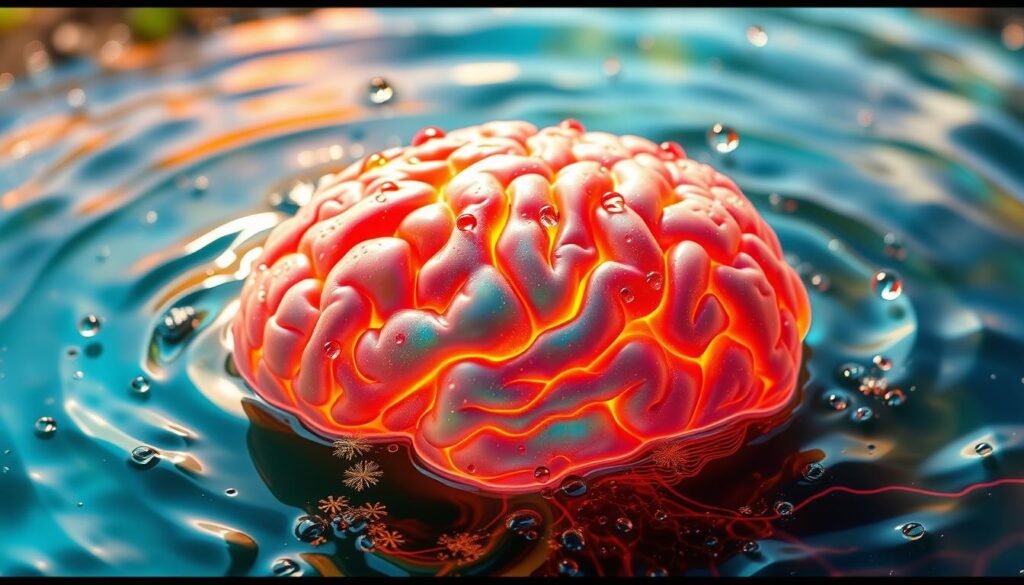
Hydration Strategies for Different Lifestyles
Keeping your body hydrated is key for good health. But, how much water you need can change based on your lifestyle and activities. Here are some tips to help you drink enough water in various situations:
The Office Worker
If you sit at a desk all day, it’s easy to forget to drink water. Keep a water bottle nearby and set reminders to drink. A reusable water bottle can also remind you to stay hydrated.
The Outdoor Laborer
Working outside and doing hard physical work can make you lose water fast. Carry a cooler with water and drinks that have electrolytes. Take breaks to drink water and wear clothes that let your body breathe.
The Frequent Traveler
It’s hard to stay hydrated when you’re traveling, whether by plane or car. Bring a refillable water bottle and drink water often, even if you’re not thirsty. Try to avoid drinks with caffeine or sugar, as they can dry you out.
Even though your lifestyle changes, staying hydrated is always important. Tailor your water intake to fit your daily life and surroundings. By doing so, you’ll keep your body hydrated and working well.
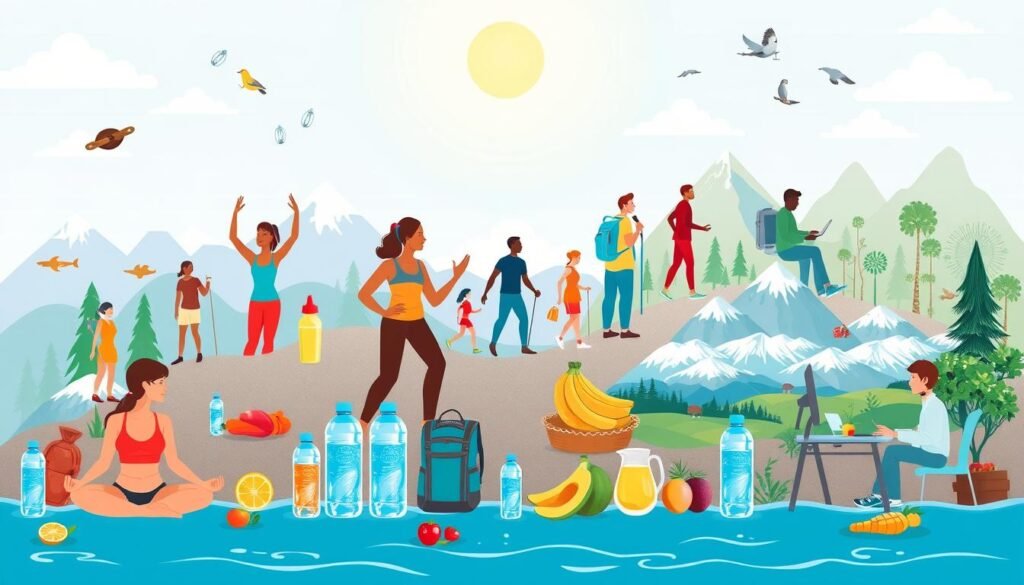
Preventing Heat Exhaustion Through Proper Hydration
As summer gets hotter, it’s key to stay hydrated to avoid heat exhaustion. This condition makes you sweat a lot, feel dizzy, and tired. If not treated, it can turn into heat stroke, which is very dangerous. Knowing how to stay hydrated can keep you safe and healthy when it’s hot.
Drinking enough water is a big step in fighting off heat exhaustion. Proper hydration helps your body cool down by sweating. Without enough water, your body can’t cool itself well, raising the risk of heat problems.
Signs of Heat Exhaustion
- Heavy sweating
- Rapid heart rate
- Dizziness or lightheadedness
- Headache
- Nausea or vomiting
- Muscle cramps
- Fatigue or weakness
If you notice these symptoms, find shade, rest, and drink water or electrolyte-rich drinks. This can help keep your body’s fluid balance and stop the condition from getting worse.
| Hydration Recommendations | During Hot Weather | During Physical Activity |
|---|---|---|
| Minimum Daily Intake | 11.5 cups (2.7 liters) for women, 15.5 cups (3.7 liters) for men | Consume 16-32 oz (0.5-1 liter) of fluid per hour of activity |
| Optimal Fluid Types | Water, electrolyte-rich drinks, juices | Water, sports drinks, electrolyte supplements |
| Timing | Drink regularly throughout the day | Hydrate before, during, and after physical activity |
By paying attention to your hydration and knowing the signs of heat exhaustion, you can keep yourself healthy and comfortable this summer. Remember, drinking enough water is the best way to avoid heat-related illnesses and enjoy the warm weather safely.
Conclusion
We’ve looked at how important staying hydrated is for our health. Water helps control our body temperature and keeps our brains working well. Knowing how to stay hydrated is key to feeling our best.
If you’re into sports or just want to stay sharp, drinking enough water is essential. Figuring out how much water you need and adding electrolytes to your diet helps keep your body balanced.
Hydration is more than just drinking water. It’s about taking care of your whole health. Drinking enough water boosts your energy and keeps you safe from heat sickness. Start hydrating well and see how it changes your life for the better.
FAQ
Why is hydration so important for overall health?
Hydration is key for our body’s functions. It helps control temperature, supports cell processes, and moves nutrients. It also helps remove waste. Drinking enough water is vital for our health and well-being.
What are the common signs of dehydration?
Signs of dehydration include feeling very thirsty, dry mouth, and feeling tired. You might also get headaches, feel dizzy, and have dark yellow urine. Spotting these signs early can prevent serious dehydration problems.
How much water should I drink daily?
Daily water needs vary by age, gender, and activity level. Adults should aim for 11.5 cups (2.7 liters) of fluids daily for women and 15.5 cups (3.7 liters) for men. Adjust your intake based on your personal needs.
Why are electrolytes important for hydration?
Electrolytes like sodium, potassium, and magnesium are crucial for hydration. They help balance fluids, support muscle and nerve function, and aid in bodily processes. It’s important to replenish them naturally for good hydration.
How does hydration affect physical performance?
Hydration is vital for athletes. It helps with endurance, recovery, and prevents fatigue. Staying hydrated before, during, and after exercise is essential for top performance.
Can dehydration impact mental function?
Yes, dehydration affects brain function, mood, and focus. Drinking enough water supports brain health, improving memory and concentration. Treating dehydration early can boost mental performance.
How can I stay hydrated in different environments and lifestyles?
Hydration needs change with lifestyle and environment. Office workers should carry water bottles. Outdoor workers need more fluids due to sweat. Travelers should drink water to combat air travel effects. Adjust your hydration based on your lifestyle.
What is the link between hydration and heat exhaustion?
Hydration is key in avoiding heat exhaustion. Dehydration makes it hard for the body to cool down, causing symptoms like excessive sweating and dizziness. Drinking enough water, especially in hot weather, helps prevent heat exhaustion.

Hello, I’m Jimmy, founder of Jimmy Cozy Life. I’m here to help you create a home that feels warm, stylish, and balanced. With ideas for decor, celebrations, wellness, and DIY projects, my goal is to share practical tips and a bit of inspiration to make your space truly special.
Disclosure: This post contains affiliate links. If you click and make a purchase, we may receive a small commission at no extra cost to you. The content on this website was developed with assistance from AI.



